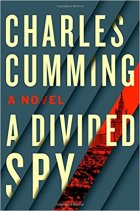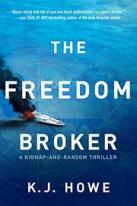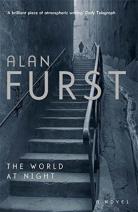Here are the second titles that have been submitted so far for the Adventure fiction subgenres of Political Thriller and Espionage. Please submit yours if you haven’t done so yet! This list is in alphabetical order by author:
 Title: A Divided Spy (2017)
Title: A Divided Spy (2017)
Author: Charles Cumming
Main Appeal Factors: Inside details about spycraft and international intrigue; complex characters; a classic espionage story updated for contemporary times
Genre: Espionage
Annotation/Thoughts: Third in the Thomas Kell series by Charles Cumming, A Divided Spy contains some plot spoilers for the first two books, but can be read as a standalone title without difficulty.
Pacing is fast in that most of the action of the book takes place over a short period of time, but there is a fair amount of character development and backstory, as well, which, while adding depth to the book, makes parts of the book proceed at a slower pace than a reader looking for a non-stop action thriller might want.
The main character, Thomas Kell, is a disillusioned former spy who — although he has left MI6 (England’s Secret Intelligence Service — is still seeking answers from (and revenge on) the Russian agent he blames for the death of another agent. The storyline is centered at first around Kell’s quest as he gets wind of his quarry, but escalates quickly from personal concerns to national security as Kell wonders if he’s playing or being played by his opposite number, the charismatic Russian agent, Alexander Minasian. Tone is dark, in classic espionage style. The language is rich with both spy jargon and literary references; the main characters are well educated and extremely good at what they do. Various cities in different countries serve as the setting, but the frame is England and its intelligence service. Readers will learn a lot about what constitutes good “spycraft” while enjoying an exciting and suspenseful contemporary tale of espionage.
Definitely would suggest Charles Cumming to readers who like John Le Carré.
 Title: Freedom Broker
Title: Freedom Broker
Author: K.J. Howe
Main Appeal Factors: worldwide, terrorists, non-stop
Genre: Political Thriller
Annotation/Thoughts: First in Kidnap-and-Ransom Thriller series.
Main character, Thea, is a kidnap victim rescuer for a firm that specializes in kidnappings for money by terrorist groups. Very up-to-date issues including China trying to take control of African countries.
Pacing: breakneck: starts with tense scene in jungle, has a break, and then jumps right into a kidnapping
Characterization: main character has elaborate backstory as well as type 1 diabetes. All the characters are complex. Told from multiple narrators.
Story Line: action oriented and plot twists
Frame and Tone: detailed settings, all over the world.
Style: straightforward with just enough description for the setting without slowing down the action.
 Title: The Singularity Race
Title: The Singularity Race
Author: Mark de Castrique
Main Appeal Factors: AI, Secret Service, computers
Genre: Political Thriller
Annotation/Thoughts: Artificial Intelligence has been in the news a lot frequently, with dire warnings about how the Chinese look to be outrunning us in the race to come up with AI that can think better than humans. This book uses AI as the “weapon” and our hero, Rusty Mullins, is racing to stop a computer from taking over the US infrastructure and indeed the whole world. The technology isn’t the focus so much as the human relationships and basic spy work. As such this book works really well as an adventure fiction/thriller. It certainly was hard to put down. So far there only seem to be two books (this is the 2nd) in the series, so it may just be a two-book set. I haven’t read any of de Castrique’s other books.
Pace: page-turner; starts with a kidnapping/murder and goes to terrorist attack
Characterization: Main character has a backstory, good family life and friends, but is still a “hero” with lots of skills as a former secret service man; Some romance; side characters not fully developed
Story Line: very timely; AI is a weapon.
Frame and tone: While there is some points of view of other people, most of the story is told from the hero’s point of view.
Style: straight-forward, but with emotions involved. Descriptions are minimal.
 Title: The World at Night (1996)
Title: The World at Night (1996)
Author: Alan Furst
Main Appeal Factors: Setting (Paris 1940-41), Mood (dark), Storyline
Genre: Political Thriller/Espionage
Annotation/Thoughts: The World War II time period as well as Paris, France were the initial appeal factors for me. The protagonist, Jean-Claude Casson is a film producer who lives in the 16th Arrondisement, which was and still is swanky and just west of the Seine. The book is written in 3rd person through the eyes of Casson. The book opens on the day that the Germans prepare to march into France. Casson is called up to enlist as a film maker but his days in the army are short lived as the Germans invade France and take over Paris in a very short period of time. When Casson returns to Paris a couple of months later, the city seems ghostlike. With the shortages in food, electricity and heat, Casson needs to find work and his lawyer advises him to continue on as a film maker. Casson is eventually hired by a German production company. As he starts pulling together the makings of a film with a woman he loves as the star, he is asked by the Germans to do some work for them and then asked by the resistance to also work for them. Although I was confused by the seemingly large number of characters, the pacing moved along. The book has nine chapters, and breaks between the text on almost every page. Casson as well as a couple of other characters are well developed and the City of Paris is also like a character. The mood is dark and gets darker as the book goes on, as does the action which builds towards the end of the book.
Fourth in Night Soldiers series.

 The Southeastern Mass. Reader’s Advisory Roundtable (SE-RART) met Tuesday, April 3, at the John Curtis Free Library to discuss two subgenres of Adventure: Political Thrillers and Espionage.
The Southeastern Mass. Reader’s Advisory Roundtable (SE-RART) met Tuesday, April 3, at the John Curtis Free Library to discuss two subgenres of Adventure: Political Thrillers and Espionage.
